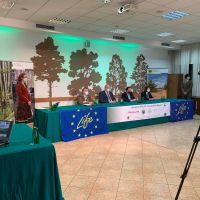On March 17, the first press conference of the project Kampinos WetLIFE took place. It was combined with the ceremonial signing of partnership agreements. The podcast from this event is available at: https://www.youtube.com/watch?v=YkZO6d_dLuU
Below you can find also a brief summary of the project and answers to questions that were not asked during the broadcast (in Polish).
Start of the project “Kampinos WetLIFE”: another step towards protection of wetlands of the Kampinos Forest
The Kampinos National Park together with its partners: REC Poland, the Warsaw University of Life Sciences and the Marshal’s Office of the Mazowieckie Voivodeship are starting another comprehensive project to protect wetlands in the Kampinos Forest. It is a continuation of the “Kampinos Wetlands” project implemented in 2013-2019, under which over 40 small retention facilities were built.
This time, the activities will focus on three areas located in the central and western part of the Kampinos National Park, on land owned by the State Treasury. The main goal is to increase water retention by building a number of small retention facilities and redirecting it from artificial canals to numerous natural depressions. The project includes, among others, the construction of 15 thresholds on the Łasica, Zaborowski and Ł-9 channels, 35 ponds, naturalization of over 8,000 meters of channels, grazing, restoration of extensive farming on 108 ha of meadows, fighting invasive species, multiplication and reintroduction of protected snails and amphibians and the construction of nesting platforms for the black stork and birds of prey. It is also planned to purchase 80 ha of land, environmental and hydrological monitoring and communication activities. The project is financed in 60% by LIFE Nature, 35% will be contributed by the National Fund for Environmental Protection and Water Management, and the remaining 5% by project partners.
When planning project activities, particular attention was paid to the protection of invertebrate habitats related to wetland habitats: snails, both those associated with marshy meadows and rushes (Vertigo moulisiana and angustior) and water reservoirs (Anisus vorticulus), the Leucorrhinia pectoralis and Graphoderus bilineatus, as well as two species of moths inhabiting wet meadows: the Phengaris telejus and Lycaena dispar. Most of these animals need small water reservoirs to live and reproduce, which, although present in the marshes of the Kampinos National Park, often disappear in dry periods, which poses a threat to the survival of their population. In addition to stopping the outflow of water during low flows, the protective measures include, inter alia, deepening and increasing the number of ponds, as well as moving some of them to new positions prepared in this way.
Mirosław Markowski (Director of KPN) – The wetlands of the Kampinos Forest still need protection against drought. Recent dry years have shown how vulnerable these ecosystems are. Thanks to the land purchase that have been carried out by Kampinos National Park for many years, now most of the wetlands of this area are owned by the State Treasury. This allows us to plan today large-scale retention measures away from buildings and private land. Partnership cannot be overestimated here – scientific and expert support from the Warsaw University of Life Sciences, cooperation with local governments strengthened by the support of the Marshal of the Mazowieckie Voivodeship and the experience of the REC Poland foundation in implementing active protection activities in the Forest, as well as the contacts it established in the previous project with the inhabitants.
Adam Struzik (Marshal of the Mazowieckie Voivodeship) – Extreme weather phenomena, intensified by climate change – droughts and floods, are a problem not only for nature, but also for humans. The areas of central Poland, including the Mazowieckie Voivodeship, are increasingly struggling with water shortage in agriculture, and there are also problems with providing water for industry and residents. Natural retention is the primary way to deal with this problem. That is why the self-government of the Mazowieckie Voivodeship joined the implementation of this project. I would like similar retention measures to be implemented not only in the Kampinos National Park, but also in other areas of the Masovian Voivodeship, e.g. in five Mazovian landscape parks, scattered throughout the voivodeship.
Michał Jerzy Zasada (Rector of the Warsaw University of Life Sciences) – Warsaw University of Life Sciences has been present in the Kampinos National Park for several dozen years. Many years of research on the waters in the Kampinos National Park show that measures to increase water retention in this area are necessary and feasible. The experience of the staff of the Warsaw University of Life Sciences, among others, in the Biebrza National Park and the “Ujście Warty” National Park also show that it is possible to protect wetlands in accordance with the interests of the inhabitants of these areas.
Karol Kaszyński (REC Poland foundation) – For centuries, the wetlands have been perceived as magical on the one hand, and even scary and dangerous on the other. Over the past 200 years, the Kampinos Forest has been cut with a network of drainage channels to adapt these areas to agriculture. Today, due to poor soils, agriculture has almost completely disappeared in these areas, so the channels have lost their original function. Meanwhile, in the era of more and more visible climate changes, Kampinos Forest can play another important role. The local swamps can retain water, alleviate the local microclimate, absorb carbon dioxide, and at the same time be one of the most valuable natural areas in central Poland, attracting crowds of tourists and giving Varsovians the opportunity to rest. The project “Kampinos WetLIFE” is another step in this direction.
Project budget: 5 340 169 euro (including: 60% LIFE, 35% NFOŚiGW, 5% partners’ own funds)
For more information please contact: pdzierza[at]recpolska.org, phone no. +48 888 838 676


 RETURN
RETURN
